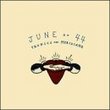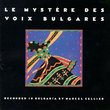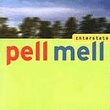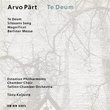| All Artists: Steve Reich, De Leeuw, Schoenberg Ensemble Title: Tehillim Members Wishing: 1 Total Copies: 0 Label: Nonesuch Release Date: 11/8/1994 Genres: Dance & Electronic, Pop, Classical Styles: Techno, Vocal Pop, Historical Periods, Modern, 20th, & 21st Century Number of Discs: 1 SwapaCD Credits: 1 Other Editions: Tehillim, Tehillim UPC: 075597929522 |
Search - Steve Reich, De Leeuw, Schoenberg Ensemble :: Tehillim
 | Steve Reich, De Leeuw, Schoenberg Ensemble Tehillim Genres: Dance & Electronic, Pop, Classical
It was with this critical work, Tehillim (the Hebrew word for psalms), that Steve Reich demonstrated that minimalism had the power to break out of its groupie ghetto and appeal to a broad audience of music lovers. In creat... more » |
CD DetailsSynopsis
Amazon.com essential recording It was with this critical work, Tehillim (the Hebrew word for psalms), that Steve Reich demonstrated that minimalism had the power to break out of its groupie ghetto and appeal to a broad audience of music lovers. In creating a masterpiece both expressive and approachable, Reich used the oldest trick in the book: he turned to a biblical source--exactly the sort of thing that composers have been doing since the dawn of recorded music. The result is remarkable in every way, and the music's popularity in performance speaks for itself. This recording, effectively with the work's "original cast," is unlikely to be bettered. It belongs in the collection of anyone who cares about the most important music of our time. --David Hurwitz Similarly Requested CDs
|
CD ReviewsYow! Gorgeous, lush non-liturgical music that is liturgical David J. Huber | New York, NY United States | 07/05/2000 (5 out of 5 stars) "Objectively speaking, this CD is brilliantly and perfectly recorded - the notes are all there, the performance is 100%, and more importantly, the recording engineer turned out a perfectly recorded and balanced CD.I have not performed this piece, unlike the first two reviewers, but I heard it performed at BAM. Let me say that following a score and keeping one's place while simply listening to a recording is super difficult - but keeping one's place while performing, well, I've never seen a group of performers concentrate so intently on the music as I did at the performance, and that's *not* due to any lack of skill from the musicians. Steve Reich's music is the kind that if you're performing and lose your place, you're done: you sit out at least until the next section. There is no forgiveness for being off by so much as a sixteenth note.I have followed Reich and his music for 16 years. Much of his music moves me to tears (cf. Music for 18 musicians, The Cave, and Music in Four Sections). But Tehillim (the Hebrew word that Christians translate as "Psalms") I find to be his most beautiful (that's a subjective rating). Although Reich did not compose this as liturgical music, of course it could be used as such, given its holy writ text. If I may climb my theological/liturgical soapbox, Tehillim represents, in fact, how exciting liturgical music *could* be if the Church were but willing. Not only is this music modern (and thus more relevant for today's Church), but it is an incredibly sensitive and moving setting of two psalms. I have listened to it probably 100 times, and each listening still brings tears - the tears that exceptional music brings. Tehillim is beautiful, and that's the highest compliment one can give to any music. It is also challenging and different, and will cause you to rethink your whole idea of what music is and can be, and especially what *liturgical* (Christian, Jewish, and Muslim) music could be.Musicologically, Tehillim is incredible. The scoring for is 4 female voices, polyphonic and Renaissance-like, with a constant polyrhythmic percussion background (clapping, tuned tambourines, marimbas, maracas, vibraphone, crotales, and string and synthesizer drones among other techniques). The percussion will excite and fill you with joy (and fill you with awe that any group of humans can actually perform it). The vocals will leave you wondering how a performance so beautifully and perfectly precise could come from anything merely human.Psychomusicologically and physiomusicologically, after every listening of this psalm setting, I feel that all is right with the world. If the final "Hallelujah", one of music's most beatific moments, doesn't lead you to praise God, Allah, or some kind of universal "Other", then, well, I'd be surprised.This recording belongs in your collection. If you are not a fan of minimalism or Reich or modern music, or are afraid because of it's "religious" overtones, give it a try anyway. It's an absolutely important piece for your music library." The first recording of a great work 10/22/2002 (4 out of 5 stars) "I strongly disagree with the previous reviewer who rated this CD beneath the one with Reich on the cover. That Nonesuch recording is really a disaster -- the rhythm is mechanical, which makes the performance pretty flat and passionless; the intonation, particularly in the slow movement, is awful (far worse than anything on this disc); and the voices have none of the pop-music lightness that the composer asks for. This recording, in contrast, is pretty inarguable. It's the first recording and represents the composer's original intentions. In recent weeks, many reviewers have said they prefer the brand new version on Cantaloupe Music (with the red cover) to this old CD, which I can understand. I see both of these as terrific, extremely different interpretations of this Reich masterpiece: this original recording is cool and understated; the new recording more passionate and romantic. You can't go wrong with either one. If you've already heard this recording and feel -- like the previous reviewer -- that there isn't a good Tehillim CD out yet, check out the latest release. But I don't have many good words to say about the Nonesuch CD with Reich on the cover -- best, I think, to steer clear." Transcendent minimalism Zachary Mason | Palo Alto, CA | 09/02/2003 (5 out of 5 stars) "If you are going to buy Tehillim, which I highly recommend, get this recording, not the one with the red cover, which, while I probably would have been delighted by it if I had heard it first, after hearing this recording seems fatuous, heavy-handed, and gurgling with sloppy emotion, the singers mooing away with their faces screwed up in the high-art version of teenager-guitar-hero-face."
|

 Track Listings (7) - Disc #1
Track Listings (7) - Disc #1





